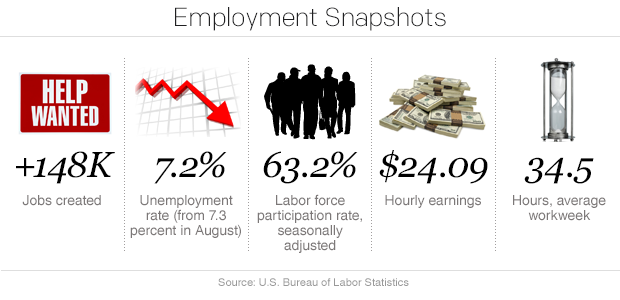Economy sagged last month as job market slows
(MoneyWatch) The job market cooled last month even before the U.S. economy went into a deep freeze because of a government shutdown.
After the closure delayed the U.S. Labor Department's latest employment report by nearly three weeks, the agency said Tuesday that the economy added only 148,000 jobs in September, short of what experts had projected. Consensus forecasts were for roughly 180,000 jobs last month. Over the last 12 months the economy has added on average of 185,000 jobs per month. That is in line with the pace of job-creation in 2012, underscoring the fitful economic growth and cautious hiring that is keeping millions of Americans unemployed.
"The labor market recovery continues, but the pace of job growth remains disappointing," said Gus Faucher, senior economist with PNC Financial Services Group, in a note to clients.
The jobless rate dipped to 7.2 percent, down from 7.3 percent in August and 7.9 percent in January. The official unemployment rate, which is derived from a different survey than the payroll numbers, is falling chiefly because many discouraged workers have stopped looking for a job.
The labor report was originally scheduled for release on Oct. 4, but got delayed by the partial government shutdown, along with multiple other government economic reports. The new job numbers are only for September and do not reflect the damage done to the labor market during the 16-day closure, when hundreds of thousands of federal employees were furloughed.
The new government data show that job growth earlier in the year was more uneven than previously thought. Employers added 193,000 jobs in August, above an initial estimate of 169,000. But data for July were revised downward to 89,000, from a first estimate of 104,000, the slowest pace of job-creation in more than a year.
More than 11.3 million Americans remain jobless, while the share of working-age Americans without a job hovers near a record high. Although unemployment has fallen from a peak of roughly 10 percent in October 2009, the percentage of adults in the labor force is up only slightly since its low in 2011, notes economist Dean Baker of the Center for Economic and Policy Research.
What remains unclear is whether the heightened uncertainty among consumers and businesses caused by the shutdown merely grazed the economy or inflicted a more serious wound. Experts say the shutdown trimmed fourth-quarter economic growth and cost the economy more than $20 billion. That is likely to dent growth over the final three months of the year, with many economists lowering their estimates to an annualized growth rate of 2 percent, down from earlier forecasts of 2.5 percent to 3 percent.
Another modest headwind: Home sales. Although the housing sector continues to rebound, sales of existing homes edged down last month amid a rise in residential real estate prices and an uptick in mortgage rates. The National Association of Realtors, a trade group, predicts that a continued uptick in rates will make homes on the market less affordable to many buyers.
Still, in a positive sign for the housing market, construction industry employment rose by 20,000 in September after having stayed flat for months.
Many analysts expect a slow build in job-creation in the months to come. "We'll get this slow, but inexorable, improvement in the jobs number right on through the end of the year," predicted Michael Thompson, managing director with investment research firm S&P Capital IQ.
The biggest wild card in charting the economy is the risk of more political disruption later this year and in early 2014. Congress faces a series of deadlines between Dec. 15 and Feb. 7 to hammer out a federal budget, pass a new continuing resolution to fund the government and raise the debt ceiling above the level agreed to last week.
For now, however, many market watchers downplay the threat of another confidence-sapping standoff. "Congress has learned their lesson, so we don't expect to see any problems this time around," Faucher said in an interview.
Beyond offering an overdue snapshot of the state of the recovery, the September employment report is important for another reason -- jobs data for the next several months is likely to be skewed by the effects of the government shutdown. That could make it harder for policy makers to get a clear read on the strength of payroll growth and broader economic growth.
For investors, that in turn could mean an extension in the Federal Reserve's $85 billion-a-month bond purchase program, which many market observers expected to be scaled back starting in December. Now a growing number of Wall Street forecasters think the central bank will delay any move to withdraw stimulus until early 2014, and possibly even later.
The Fed has emphasized that it will not change monetary policy until it sees a sustained improvement in the job market. But "such evidence will not be available this year," said Ian Shepherdson, chief economist with Pantheon Macroeconomics, in a research note ahead of the September employment data.
